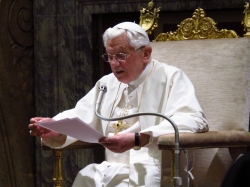On Saturday 9 February 2008, Benedict XVI delivered an address to the participants at a conference being held by the Pontifical Council for the Laity on “Woman and Man: the humanum in its entirety”.
Today, over four years later and after further study on the theme, it might be useful and significant to take another look at some of the things the Holy Father said on that occasion and to extract further inspiration and encouragement from his words.
There are a number of ideas that can be drawn from it, but here we shall concentrate on one particular direction which is basically a call to undertake further study and research.
It is certainly appropriate to begin this short reflection by quoting a phrase said by Benedict XVI and to use it as a basis for the ideas he developed in his address: “The man-woman relationship in its respective specificity, reciprocity and complementarity certainly constitutes a central point of the ‘anthropological question’, so decisive in contemporary culture and ultimately for every culture”.
The significance of this is that it is no longer possible to carry out research that deals with human beings in the abstract. In other words, you cannot omit the aspect of the difference between the sexes. This is something which distinguishes us and also that which places us in an intrinsic and ineradicable relationship.
The impossibility of disregarding this difference is made particularly clear by the fact that contemporary culture, in theory, is giving special attention to all forms of diversity. It looks at what distinguishes people from each other, but in practice it often tends to propose models that do not respect personal attributes.
The man-woman difference, within this framework, is surely the first kind of diversity to consider. It is present in all societies and touches each of us to the core of our being, even when stereotypes prevail that tend to minimise, or even to deny, this primordial fact.
In view of this situation to which the Holy Father firmly draws our attention, it is necessary that Christians should carry out “a renewed anthropological study” that is broadly based and conducted with rigour.
First of all, we must recover the heritage of our Christian tradition that is contained in Sacred Scripture and developed over two thousand years of reflection. This will demonstrate, without any uncertainty, that there are two, man and woman, who are equal in their common human nature and inalienable dignity, but different from the beginning by their sex.
Our efforts to recoup and present anew cannot be done in isolation or apart from “today's cultural sensitivity”. Rather, while both questioning and working with the results of scientific progress, this sensitivity must be accepted as a challenge and opportunity for yet further research.
The words we have quoted from Benedict XVI’s address contain what we might consider to be a clear thread that can guide Christian study. As we have seen, in referring to the man-woman relationship, he speaks of “specificity, reciprocity and complementarity”. These are identified here as being indissoluble dimensions of that relationship.
Specificity brings us to the original nature of difference, inscribed in the body and spirit of each human being. However, it comes with a caveat that it is directed towards reciprocity and complementarity. This means that its purpose is a relationship in which the different gifts that each person has are intended to be mutually enriching and to leave no space for discrimination or inferiority or any kind.
Moreover, the Holy Father clears the field of any misunderstanding over a supposed conflict between nature and culture. On the contrary, they converge on the structuring of personal identity, and thus avoid a double risk.
With the freedom of each person being reaffirmed in that way, it is on the basis of original sexual difference that a woman can decide what kind of woman she wants to be, and a man can decide what kind of man he wants to be. Secondly, there cannot be negation of each one’s constitutive sexual identity, for that is never a simple socio-cultural construct.
As you can see, if we proceed from this brief synthesis, many paths of research open up for those who wish to respond to the Holy Father’s invitation to study and reflect on a topic that affects everyone without exception. The Holy Father himself said that reductive interpretations do not only have an effect on female identity, but also on male identity.
Giorgia Salatiello






